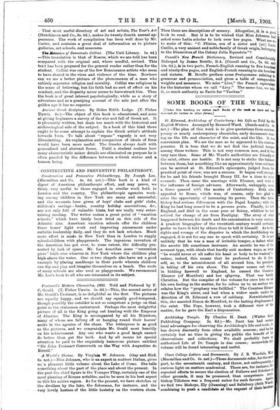SOME BOOKS OF THE WEEK.
[Under this heading we notice such Books of the wok es have sot tin reserved for review in other forms.] St. Edmund, Archbishop of Canterbury : his Life as Told by Oh English Writers. Arranged by Bernard Ward. (Sands and Co. 6a, net.)—The plan of this work is to give quotations from contero• porary or nearly contemporary chronicles, early documents bear. lug on the life and character of the saint, and the like. It is I convenient plan. We see the man as he appeared to his contea. poraries. It is true that we do not find the judicial temper among these writers. This is not very common now, and it was very rare then. Some of Mr. Ward's authorities are friendly to the saint, others are hostile. It is not easy to strike the balance between them, but something like an approximately true estimate can be arrived at. St. Edmund's episcopate, judged from the practical point of view, was not a success. It began well enough, for he and his friends brought Henry III. for a time to wiser counsels. Then came the marriage with Eleanor, and with it the influence of foreign advisers. Afterwards, unhappily, arose a fierce quarrel with the monks of Canterbury. Both site appealed to Rome, which was, of course, only too glad to seize the opportunity of increasing its power. Then the Arch. bishop had serious differences with the Papal Legate; with the King he had long ceased to be a persona grata. Finally, he left England, and died in the same year at Soissy, whither he had retired for change of air from Pontigny. The story of what happened between his death and his canonisation is very curious. A prudent biographer of the twentieth century would certainly prefer to have it told by others than to tell it himself. As to the rights and wrongs of the disputes in which the Archbishop was engaged, it is not for any one to speak with certainty. It is not unlikely that he was a man of irritable temper, a defect which the ascetic life sometimes increases. An ascetic he was of the severest type, with ideals that hardly suit modern ways, as when " he would never at all suffer his head or body to be washed,"- unless, indeed, this means that he preferred to do it him. self, as, to the astonishment of all around him, he persisted in taking off his own shoes. The temper comes out when, in bidding farewell to England, he cursed the Counter Eleanor (of Montfort) and her offspring. That was hardly Christian. But the compiler of the volume for once lets ns see his own feeling in the matter, for he refers us to an author who relates how the "prophecy was fulfilled." The Countess Eleanor was the King's sister, and had when a widow made under the direction of St. Edmund a vow of celibacy. Notwithstandi4 this, she married Simon de Montfort, to the lasting displeasure d the saint. The Pope, however, took a different view of the matter, for he gave the Earl a dispensation.










































 Previous page
Previous page